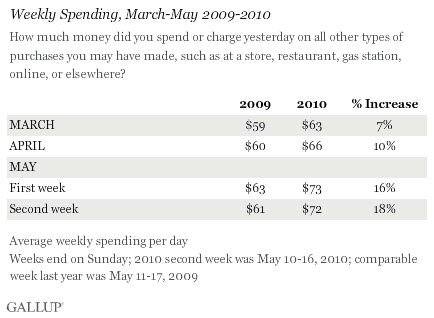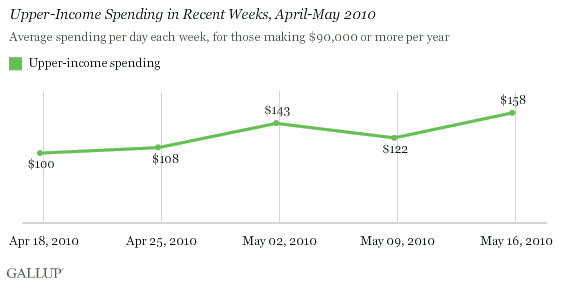PRINCETON, NJ -- Americans' self-reported spending averaged $72 per day in the week ending May 16 -- up 18% year over year. Gallup found a similar 16% increase during the prior week when spending averaged $73 per day. May's spending increases follow similar if smaller year-over-year improvements during March and April.

Early May Jump in Upper-Income Americans' Spending
During the week ending May 16, upper-income spending averaged $158 per day, compared with $122 and $143 during the previous two weeks. These are far higher spending levels than the $109 per day average of April and the $99 per day of March.

Upper-Income Spending Is Good News
There could be several explanations for the early May spending increases. Americans may have spent more in their Mother's Day celebrations during the week ending May 9 than they did a year ago, when the economy was in the depths of the recession. Further, the week ending May 16 is a "paycheck" week and Gallup analysis shows consumers are likely to spend more during such weeks than during weeks without a paycheck.
Regardless, the weekly spending increases among upper-income Americans are particularly encouraging. Prior to recent weeks, upper-income consumers did not seem to be taking part in the year-over-year spending increase that took place during March and April. Additionally, early May spending by this group seems largely unaffected, at least to this point, by the financial crisis in Greece and the European Union, not to mention the recent declines in the equity markets.
Nascent new job creation also seems to be contributing to increased spending among middle- and lower-income Americans in recent months and weeks. Add to this the recent increases in spending among upper-income consumers and -- barring some unfortunate fallout from the global financial situation that alters current company hiring and consumer spending behaviors -- a sustainable economic recovery could begin taking hold.
Review and export the complete daily trends on these measures: Economic Indexes; Consumer Spending; Economic Outlook; Economic Conditions; Job Market; U.S. Workforce
Learn more about Gallup's economic measures.
For Gallup Daily tracking, Gallup interviews approximately 1,000 national adults, aged 18 and older, each day. The Gallup consumer spending results are based on random half-samples of approximately 500 national adults, aged 18 and older, each day. Results for May 10-16 are based on telephone interviews with 3,420 adults. For these results, one can say with 95% confidence that the maximum margin of sampling error is ±3 percentage points.
Interviews are conducted with respondents on landline telephones (for respondents with a landline telephone) and cellular phones (for respondents who are cell phone only).
In addition to sampling error, question wording and practical difficulties in conducting surveys can introduce error or bias into the findings of public opinion polls.
